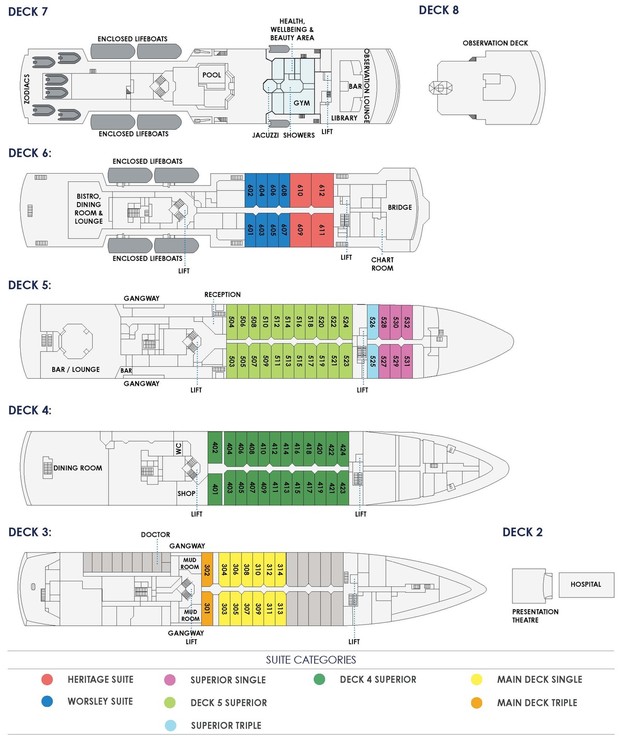
Heritage Expeditions, pioneers in authentic small ship expedition cruising, invite you to join them on an unforgettable circumnavigation of Japan's main island Honshu and exploration of its wilderness, arts, culture and rich history.
This voyage has been specially designed to explore and experience Japan's seamless blend of ancient customs with ultramodern living, incredible wilderness, wildlife and renowned arts as we cruise from iconic cities to remote coastlines and islands.
Highlights include Kanazawa's thriving centre of the arts, long known for its lacquerware, outstanding collectable pottery of the Kutani style, goldleaf workmanship, delicate hand painting of silk for kimonos and classical Noh theatre dramas performed since the 14th Century, and Naoshima Island - Japan's Art Island. Visit two of Japan's best contemporary art museums - the recently-opened Hachinhoe Art Museum and the Towada Art Center, celebrate Japan's internationally-renowned magna culture at Ishinomaki, explore the living museum Ise- Shima National Park and Japan's most sacred shrine complex Ise Jingū.
Our voyage will see us visiting the iconic Japanese island-dotted seascapes of Matsushima and Argo Bays and discovering the unique plants, wildlife and wilderness hiking trails on UNESCO registered Global Geopark Dogojima Island and Izu Oshima Island, Bandai-Asahi National Park and the impressive lakes, hot springs and volcanic wonderland of Shikotsu-Toya National Park.
Also on our itinerary is the iconic the five-storey Pagoda of Miyajima, sobering Hiroshima Peace Memorial Park with its eternal Flame of Peace, a day in South Korea's Ulsan visiting the fascinating UNESCO World Heritage Site Gyeongju - the 'museum without walls' and Karatsu's medieval heritage.
We hope you can join us for this rare opportunity to sail around Japan exploring its unspoiled nature, world renowned arts scene, culture and history.
- Explore Kanazawa's center of the arts and Noh theater dramas
- Visit Naoshima Island, Japan's Art Island
- Discover unique plants and wildlife on UNESCO Global Geopark Dogojima Island
- Experience the iconic five-storey Pagoda of Miyajima
- Learn about Japan's sacred shrine complex Ise Jingū
- Sail around Japan's unspoiled nature and rich history.
Prices quoted here are often dependent on currency fluctuations. Please check with (01432 507450 or info@small-cruise-ships.com) for the very latest price, which may well be cheaper than the one advertised here.
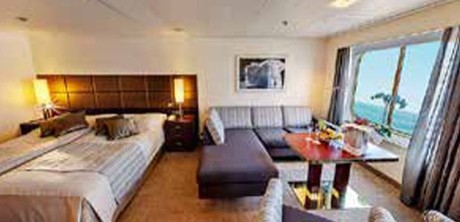

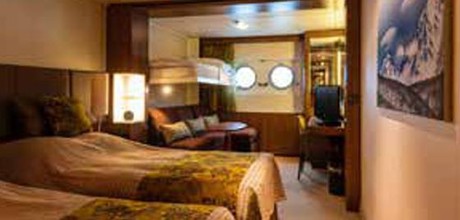
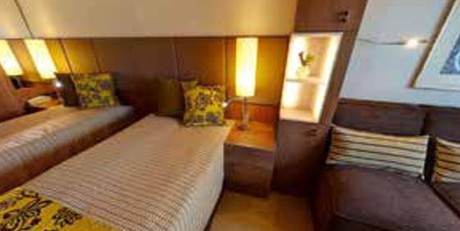
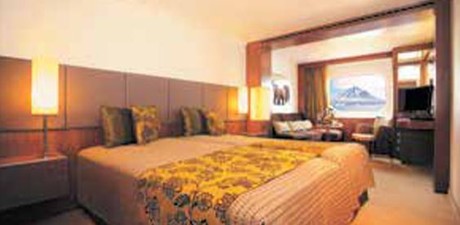
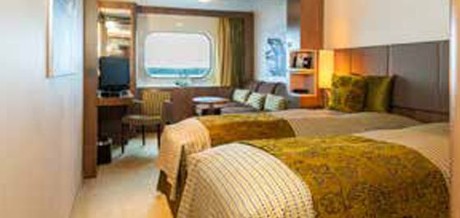

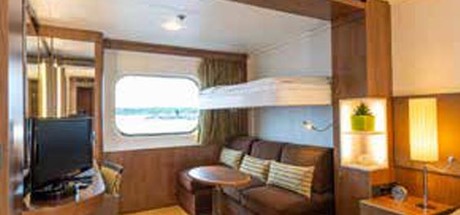
Arrive at Honshu’s largest port city Osaka where modern architecture and a vibrant dining scene are nestled alongside the 16th Century shogunate Osaka Castle, and make your way to your hotel where our group will spend the first night of the expedition. This evening meet your fellow voyagers and expedition guides over dinner at the hotel.
Enjoy breakfast at the hotel before exploring Kobe, opportunities include visiting Pure Water Temple Kiyomizudera, one of Japan’s most revered temples and a designated UNESCO World Heritage Site, built over the Otowa Waterfall and dating back to 780. Enjoy lunch at a local restaurant before exploring Buddhist temple Sanjusangen-do or Rengeo-in, renowned for its 1,001 statues of the goddess of mercy Kannon, and the ultimate torii gate experience Fushimi Inari Shrine, dedicated to the gods of rice and sake. This afternoon board Heritage Adventurer where your Captain and Expedition Team will welcome you aboard.
Expect a day like no other as we explore Ise-Shima National Park. Often likened to a living museum the peninsula of Ise-Shima, or just ‘Shima’ as it is known to the locals, there is much to discover here including endless forests and abundant nature, rich maritime history, incredible coastal scenery and Japan’s most sacred shrine complex Ise Jingū. Comprising some 125 different shrines hidden among a labyrinth of mossy walls and dating back to the third century Ise Jingū is considered the spiritual home of Shinto cosmology. Explore grand shrine, Kotai Jingū, made entirely of Japanese cypress where no metal nails or screws have been used in its construction and, in accordance with Shinto practice, is rebuilt every 20 years in order to preserve its purity. Currently in its 62nd iteration, it was last rebuilt in 2013. Shima has been an official source of seafood for Japan’s imperial family since the 5th Century and the iconic amulet-wearing ama divers, female seabed foragers have been responsibly harvesting these waters since Japan’s Jomon era. At Ago Bay gaze out over the fascinating seascape created by more than 60 islands dotting the water and observe Shima’s sacred Meoto Iwa, Wedded Rocks, connected by a shimenawa rope near the Futami-Okitama Shrine.
Izu Oshima is the largest of the Izu Islands, a chain of islands lying to the south of the Japanese mainland, which preserves its own unique natural and human history. Mount Mihara towers over the landscape at the island’s centre, to the east a dramatic cliff drops into the ocean, while gently sloping plains extend towards the west. Almost entirely covered by forests, Oshima Island was certified as a Japan Geopark in September 2010 in recognition of its unique status. This morning we will explore and discover the unique plants and birds that call the island home as well as meeting the local inhabitants to discover their way of life.
After a morning at sea with presentations from our on board experts we arrive in the port city of Ishinomaki. The city is renowned for the Shiogama Seafood Wholesale Market and its colourful urban core showcasing its ‘manga’ culture – the art of Japanese comic books and illustrated novels – thanks to famed pioneer Shotaro Ishinomori and creator of the popular Kamen Rider series. Throughout the city you can observe artworks and statues celebrating the importance of the artist and the art on Japanese culture. South of the city is Matsushima Bay, studded with more than 200 pine-covered islands and considered one of Japan’s three most iconic views, take the opportunity to explore this beautiful landscape from the shores or discover from the water.
With a Pacific shoreline of outstanding natural beauty, a clutch of fantastic cultural sights, thronging markets and delectable seafood, there is a lot to see and experience during a visit to Hachinohe and the Aomori Region. Today there will be the opportunity to explore the region’s fascinating connection with contemporary art through visits to two of Japan’s best contemporary art museums – the recently opened Hachinhoe Art Museum and the Towada Art Center. Reflecting a new approach to contemporary art, Hachinhoe Art Museum, also known as an ‘art farm’ offers a dynamic new interpretation of how and where art is created, housed in an innovative design intended to bring the community together to utilise the space. At Towada Art Centre, one of Japan’s foremost contemporary art institutions, the striking Ryue Nishizawa designed building features contemporary artists such as Leandro Erlich, Yayoi Kusama and Ron Mueck. Alternatively join a visit to the stunning Lake Towada, a 2,000-year-old flooded double caldera some 400 metres above sea level, and its surrounding forest in Towada Hachimantai National Park. Lake Towada is the largest caldera lake on Honshu, and is characterised by two large peninsula’s which extend nearly a third of the way across the lake. On a clear day Mt Towada is reflected in the still waters of the lake creating a picture post card scene. While a short walk brings you to Oirase Stream with its beautiful and dynamic cluster of 30 waterfalls.
Adventures abound at Shikotsu-Toya National Park, named after its famous twin caldera lakes. Another picturesque natural hot spot, the park’s spectacular scenery including its impressive lakes, hot springs and volcanic wonderland, are all easily accessible and offer multiple hiking and walking options. Activities here could include riding the cable car to the top of Mount Usu to take in the grand scale views over Lake Toya or visiting the geothermal spectacle of steaming vents and sulphurous streams at Jigokudani aka ‘Hell Valley’ and the Upopoy National Museum of the Ainu which stands on the shores of Lake Poroto where you have the opportunity to see and experience the Ainu culture including cuisine, music and crafts. This afternoon enjoy free time to explore Muroran at your leisure, visit the scenic cape and lighthouse or take in the city from above after a walk up Mount Sokuryo.
A key city in the Tohoku region since medieval times, Akita was once a castle town of the Satake clan, but today is a vibrant, prosperous city that seamlessly honours its past while still embracing its young energetic spirit. Noted for its burgeoning art community, there are several fine museums to explore including the Hirano Masakichi Art Museum housing a collection of work by Western and Japanese artists as well as the Akita City Folklore Museum. Venture inland to discover the Kakunodate Samurai District, a living museum that showcases the samurai way of life in a picturesque setting that remains largely unchanged since it was established in 1620. Beyond Kakunodate in the mountainous spine of Honshu is Mount Akita-Komagatake where there are excellent hiking opportunities in sub-alpine and alpine habitats at the southern-most extension of Towada-Hachimantai National Park.
Today sees us visiting the bustling port town of Niigata, famous for snow, rice, sake, hot springs and the six-arched, granite-sided stone Bandai Bridge, designated as an Important Cultural Property in 2004, and one of the most scenic spots in the city. Highlights here include Bandai-Asahi National Park, Japan’s second largest national park, combining stunning volcanic scenery and hot springs with lush forests, verdant highlands crisscrossed with walking trails and home to Asiatic black bears, squirrels, foxes, and migratory birds. Elsewhere Takada Castle Site Park, with it 3-storey castle from the Edo Period, offers panoramic views of the Takada Plain, while the 193 hectares of Fukushimagata Wetlands is home to endangered flora and fauna, including the rarely seen gigantic lotus Euryale Ferox, and listed on Japan’s 100 greatest natural environments.
Options today include exploring the historic mountain settlement and UNESCO World Heritage Site of Shirakawa-go, high in the remote mountains of the Shogawa River Valley in Hakusan National Park. Take in the sights on mountain walks and experience the unique cultural traditions including the region’s iconic Gassho-zukuri farmhouses, some of which are more than 250 years old, designed to withstand the heavy snow in winter an provide a large attic space for cultivating silkworms. Alternatively explore the rich art centre of Kanazawa discovering some of the unique styles of Japanese art. Kanazawa is rightly famous for its Kutani-style pottery, exquisite lacquerware, gold-leaf workmanship, hand painted silk, and classical Noh dance-drama performed since the 14th Century. Wander winding cobblestone streets, elegant restaurants, craft galleries and visit the impressive Edo-period Kenrokuen Garden, one of the Three Great Gardens of Japan, and explore the Omicho Market boasting everything from flowers, to crafts and food.
Picturesque and otherworldly, Dogojima Island is the largest of the Oki Islands in the Sea of Japan and part of the Daisen-Oki National Park and a UNESCO registered Global Geopark. Accordingly it is home to outstanding coastal scenery to explore and experience. With its clear water beaches, bays, inlets and coves, impressive towering cliffs and rock formations eroded by the elements to the dense forests and steep mountains, including Mount Daimanji which rises more than 600-metres, and ancient sacred sites of its interior, today we discover a rarely visited corner of Japan.
Today we cross the Sea of Japan to Ulsan in South Korea where we plan to visit the UNESCO World Heritage Site of Gyeongju. The capital of the Shilla Dynasty and dating back to the first millennium, Gyeongju is known as ’the museum without walls’ and is full of ancient Korean history and Buddhist culture. Enjoy strolling through hundreds of excavated monuments, temples, tombs and pagodas, and experience Korean delicacies, cultural performances, and visit the National Museum with its gold jewellery, metal weapons, and distinctive pottery. Today provides a perfect taste of the best South Korea has to offer.
Once a major stop for ships and trading post between Korea and China, Karatsu is well known for its medieval heritage including the Karatsu Castle. Built on a plain, construction began in 1602 and the castle is also known as the ‘flying crane castle’ as its shape resembles a bird in flight. We will tour the castle including the Exhibition Hall, which houses the floats and artefacts used in the annual Karatsu Kunchi autumn festival. If you have an interest in plants and/or pottery, an alternative option for today is a visit to the city of Imari celebrated for its porcelain pottery kilns and the flower-laden Mifuneyama Rakuen garden.
Despite its history including being the site of the world’s first atomic bomb attack on the 6 August 1945, Hiroshima is a vibrant and thriving cosmopolitan community. We plan to visit the beautiful Peace Park and Museum, with its sombre cenotaph containing names of atomic bomb victims, and the permanently lit ‘Flame of Peace’. After visiting the Peace Park we will travel to Miyajima Island, considered one of Japan’s most scenic spots and the location of the Torii Gate and the Daisho-in Buddhist temple. For those after a nature fix, ascend Mount Misen on Miyajima Island by cable car and enjoy a hike, admiring the views below of the Shinto Shrine and Torri Gate.
Shikoku Island’s Takamatsu has had a long history as a port town earning itself the nickname ‘Gateway to Shikoku’, although more recently locals have been calling it ‘Udon Kingdom’. If you have an interest in plants a visit to Ritsurin Park, considered one of Japan’s finest gardens, is sure to be a highlight. Next you will enjoy a visit to Kinashi, one of Japan’s main bonsai production centres, where you will learn about traditional methods of growing bonsai. For those interested in history and art you may wish to travel to Naoshima Island for a full-day excursion. Shikoku Island is known for its art and this excursion to Naoshima will have you admiring its architecture and art museums, including Chichu Art Museum and Benesse House, featuring work by Japanese and international artists.
This morning sail back into Kobe, after breakfast there will be a complimentary coach to a central hotel or to the Osaka airport. To allow time for disembarkation procedures and travel from Osaka, we do not recommend booking flights departing before 1300 hours.
Itineraries are subject to change.
Heritage Adventurer
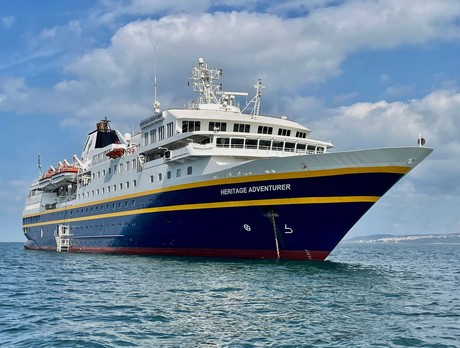
| Length | 124 |
|---|---|
| Built / renovated | 1991/2021 |
| Ice classification | Lloyds 1AS, GL E4 |
Heritage Adventurer is a true pioneering expedition vessel of exceptional pedigree. Often referred to as the ‘Grande Dame of Polar Exploration’ due to her celebrated history and refined design, she was purpose-built for adventure in 1991 at Finland’s Rauma shipyard and specifically designed for Polar exploration.Setting a peerless standard in authentic expedition travel, Heritage Adventurer (formerly known as MS Hanseatic) combines the highest passenger ship ice-class rating (1A Super) with an impressive history of Polar exploration. Having held records for the most northern and southern Arctic and Antarctic navigations, and for traversing both the Northwest and Northeast Passages, makes Heritage Adventurer perfect for pioneering experiential expedition travel. Originally designed to accommodate 184 guests, Heritage Adventurer now welcomes just 140 expeditioners ensuring spacious, stylish and comfortable voyages, while a fleet of 14 Zodiacs ensures all guests are able to maximise their expedition adventure. Heritage Adventurer proudly continues our traditions of exceptional, personalised expedition experiences as Heritage Expeditions flagship.
Observation Lounge – One of the most celebrated and best-known features of Heritage Adventurer is the awe-inducing Observation Lounge, Library and Bar. Located on Deck 7 and perched directly above the Bridge, enjoy sweeping 270-degree views through floor to ceiling windows, perfect for wildlife spotting and quick access to the outer deck. Bring your binoculars to spot wildlife, observe the ever-changing landscape, write in your journal or relax with a book.
Observation Deck – Enjoy 360-degree views from the highest point on the ship. The Observation Deck sits above the Observation Lounge and provides exceptional outside viewing options. Stretching the full width of the vessel, this is the perfect spot to take in the surrounding land and seascapes. Perfect on a sunny day, recline in the comfortable sun loungers protected from the wind and elements and watch your voyage unfold.
The Bridge – No expedition is complete without visiting Heritage Adventurer’s busy nerve centre. Located on Deck 6, Heritage Expeditions’ Open Bridge Policy means you are welcome to observe the Captain and crew at work while enjoying some of the ship’s best views. It’s a fascinating place to learn about navigation and vessel operations, however please note the Bridge will be closed when departing or arriving at port.
Dining Room – Indulge in fine international cuisine from our talented chefs in the lavish surrounds of our Dining Room on Deck 4. Sensational 270-degree views provide a stunning backdrop to meals here along with an international wine list featuring many outstanding regional wines. With relaxed seating arrangements, all guests can enjoy dining in a single sitting from hearty breakfasts setting you up for the day’s adventure to sumptuous lunches and multi-course evening dining.
Bistro – Simple fast and delicious meals and snacks are on offer in our relaxed Bistro on Deck 6. Perfect for early risers to enjoy tea, coffee and light breakfast options the Bistro provides great views and opens directly onto a covered and heated teak-deck outdoor dining area.
The Bar and Lounge – The social hub of Heritage Adventurer, the Bar and Lounge on Deck 5 features seating for all guests. Enjoy a beverage at the bar, sink into an armchair, relax on one of the many spacious loungers and watch the world go by through the panoramic windows or make new friends at the communal seating. This multi-tasking space also doubles as the location of daily briefings and evening recaps with the expedition team.
The Gym – Featuring spectacular ocean views, the well-equipped gym is adjacent to the pool, hot tub and sauna in Deck 7’s wellbeing zone. Maintain your routine with an elliptical cross trainer, treadmill, rowing machine, stationary bikes, TRX as well as free weights, yoga mats and fitness balls. Towels are provided with change room and shower amenities nearby.
Sauna and Steam Room – True to her Nordic origins, Heritage Adventurer features a dry-heat Finnish sauna and European steam room on Deck 7. Perfect for warming up post Polar plunge or unwinding after a day’s adventures, the sauna and steam room include change room facilities, showers and towels.
Swimming Pool and Hot Tub – Surrounded by relaxed teak seating including sun loungers, the open-air saltwater pool can be heated or chilled. Encased in glass the hot tub ensures all-weather use, perfect for those who like to relax with a view following a day of exploring.
Lectures and Presentations – Enjoy informative and entertaining lectures on history, biology, wildlife, and ecology in the comfort of the Presentation Theatre. With state-of-the-art audio-visual equipment, our world-renowned expedition team will bring your adventure to life through interactive presentations and discussions.
